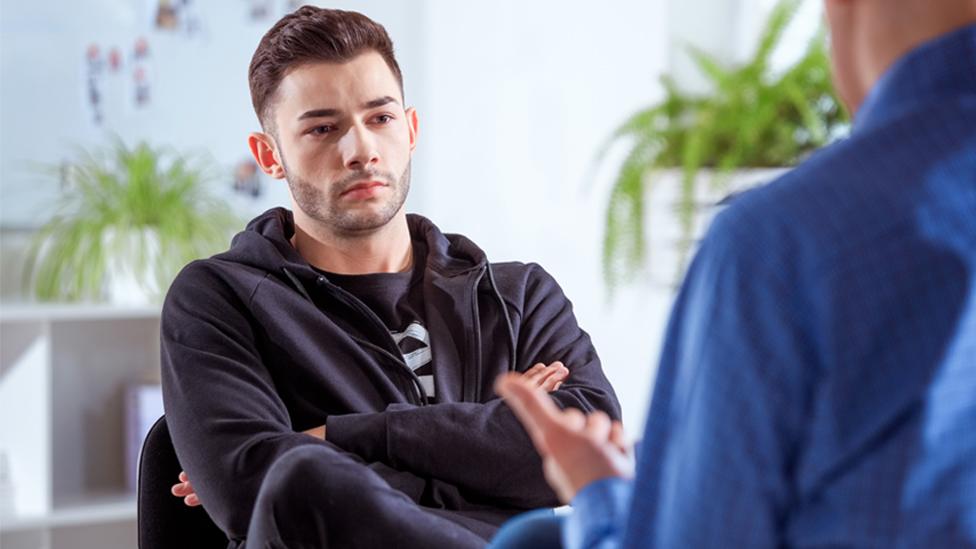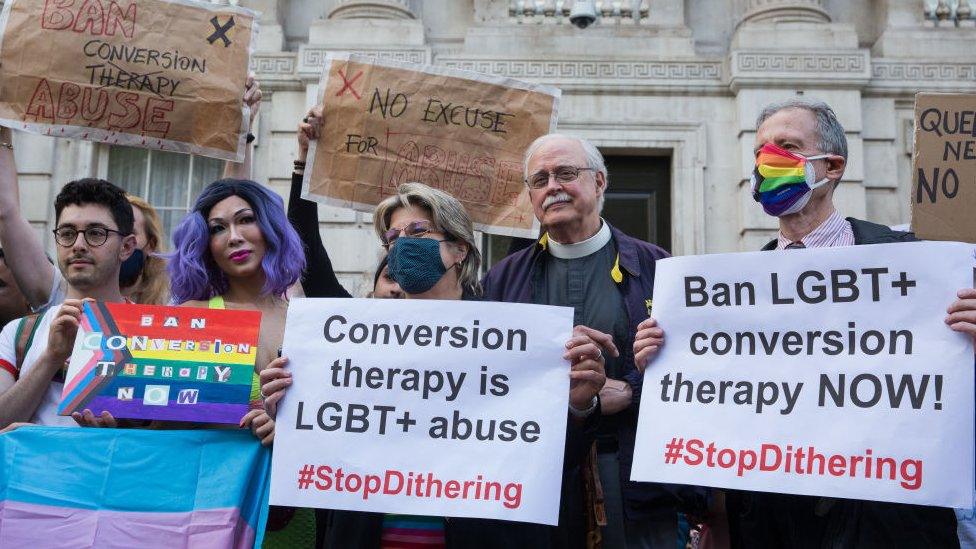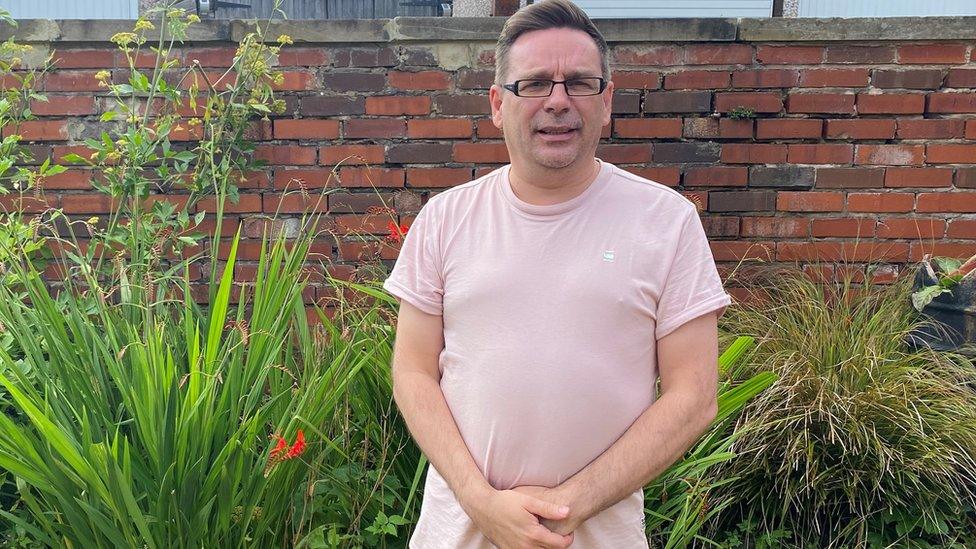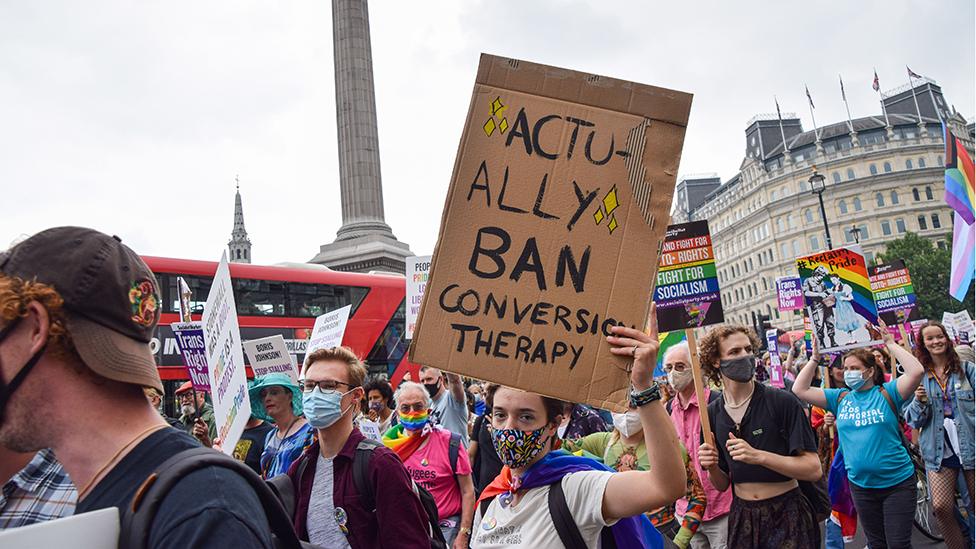Conversion therapy delay frustrates campaigners
- Published

A public consultation into a proposed ban on so-called conversion therapy has been delayed by at least a month, until possibly the end of October.
The consultation will invite the public to give their input over what the terms of the ban should be.
This includes how to safeguard therapists and religious freedom, while protecting people from harm.
LGBT groups have expressed frustration at the delay, with the founder of one calling it "incredibly disappointing".
Conversion therapy seeks to change or suppress someone's sexual orientation or gender identity, health bodies say.
In practice, it means trying to stop or suppress someone from being gay, or from living as a different gender to their sex recorded at birth.
In 2018, Theresa May's government promised to end conversion therapy as part of its LGBT action plan., external Last summer, Prime Minister Boris Johnson said plans for a ban would be brought forward.
But earlier this year, the government said it would instead open a public consultation in September around what that ban would look like.
This was, it said, to make sure the legislation addresses the practice while "protecting the medical profession, defending freedom of speech, and upholding religious freedom".
However, the public consultation will not commence now until late October.

Protestors at the Cabinet Office called for an immediate conversion therapy ban in June 2021
Campaigners and conversion therapy survivors have expressed their frustration at the news.
Matt Hyndman, the co-founder of the Ban Conversion Therapy campaign, said: "Every single day the government delay, more and more LGBT people are at risk of being subjected to conversion therapy."
Stonewall chief executive Nancy Kelley agreed, and added: "We urge the government to set a new deadline for the public consultation as soon as possible, as part of their commitment to a ban."
Campaigner and conversion therapy survivor Jayne Ozanne, also expressed her frustration.
"What is needed is a far greater sense of urgency and a commitment to a timetable that will reassure us that legislation will soon be passed," she said.

The government is understood to be keen to avoid a repeat of the consultation process around reforming the Gender Recognition Act, which stretched to almost three years.
"As a global leader on LGBT rights, this government is committed to banning the practice of conversion therapy," a spokesperson for its Equality Hub said.
"We will be launching a consultation seeking views on our plans to ban the practice in a manner that is effective. More details will be announced shortly."
It is understood that a report into people's experiences of conversion therapy will be published alongside the consultation. It was commissioned by the government more than two years ago and the results given to ministers last December.
The government has already received input from LGBT, religious and other interested parties ahead of the public consultation.
Some of these groups say they are concerned its wording may mean they won't be able to fully engage with people questioning their sexuality or gender identity, who need their support.
The Association of Christian Counsellors (ACC) is one of the organisations that has been in discussions with the government.
Kathy Spooner, its chief executive, argues that the existing memorandum of understanding (MOU), external on conversion therapy, which was signed by major health organisations, works well in terms of safeguarding in counselling.
"The way the MOU is written at the moment means any counsellor can work with people who have conflicts about different sections of their identity," she said.
She says the ACC is not against the conversion therapy ban and can see that it gives clarity. But the organisation has told the government the wording of the legislation may accidentally isolate some LGBT Christians.
"Those giving the support won't know what they can do and what is disallowable, and when people are confused they tend to withdraw," she said.

'I learnt to split my life into different parts'

Justin Kennedy was subjected to conversion therapy for five years
Minister-in-training Justin Kennedy was subjected to conversion therapy in his early 20s.
After unsuccessfully trying to bury his sexuality in his early teens, he says he became suicidal and asked for prayer to help change his sexuality.
The then-minister at his church found two people who specialised in what they called "deliverance" - "getting demons out of people and setting them free".
He would attend sessions and weekends away with the couple several times a year where they would make him go back through his family history, sexual history and his childhood.
"I spent about five years going to prayer, having hands laid on me, reflecting on my sins. The more I went to those sessions, the more shame came into my life, the more suicidal I became. I learnt to split my life into very different parts - the gay Justin and the Christian Justin.
"It was very manipulative, the deliverance therapy, because I wasn't really ever allowed to say no."
As a minister, others now approach him to discuss struggles with their sexuality. But the difference, he says, is that he embraces who they are.
"If a gay person said to me, 'I've accepted who I am but I'm getting out of control with my sex drive and I'm doing things I'm not happy with', I would say, 'we are going to pray together so you can gain control of your life' while acknowledging their sexuality," he says.
He believes a blanket ban would help to start a wider conversation in religious settings.
"It would be like a dam bursting," he says. "All of a sudden it gives people like me and other affirming ministers an avenue with which to be frank with their congregation that we are living in a completely different world now."
Related topics
- Published20 September 2024
